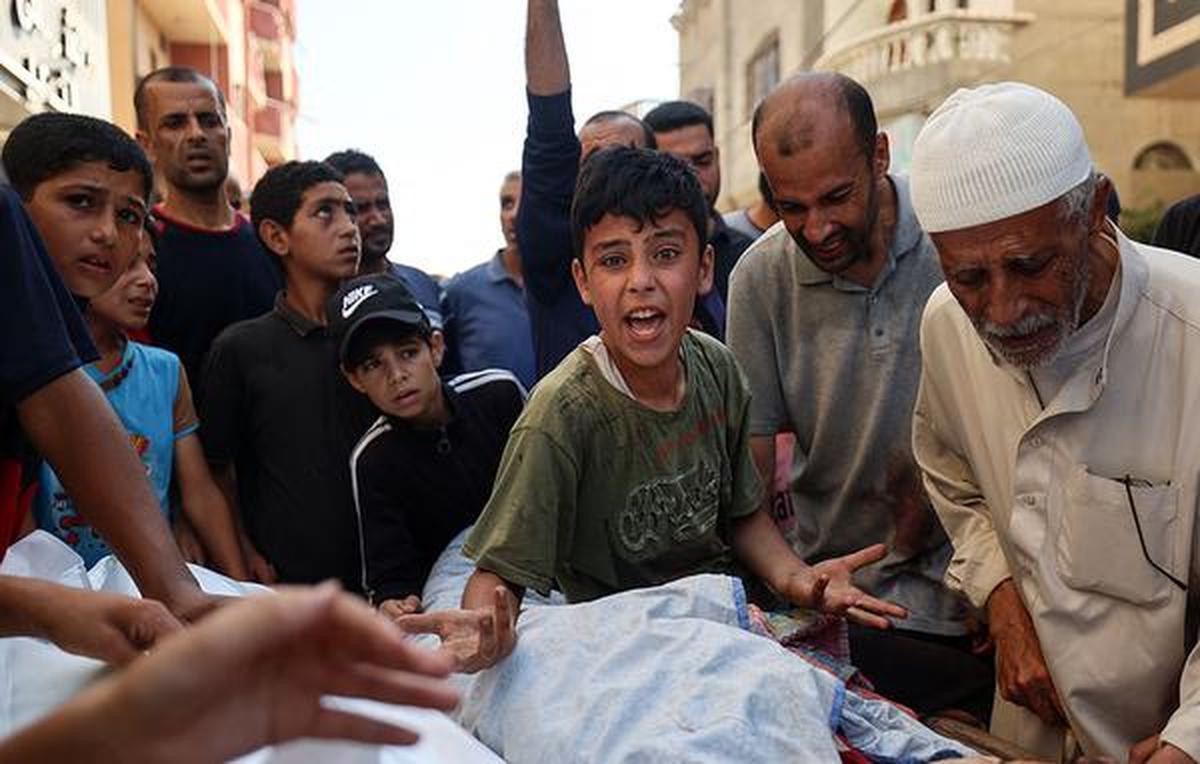[ad_1]
In January 2024, South Africa initiated proceedings against Israel at the International Court of Justice (ICJ), alleging that Israel’s military campaign in Gaza amounted to genocide. The application was filed just over two months after the Hamas-led attacks of October 7, 2023. Although the court has not yet ruled on the merits of the charge, it has issued a series of binding provisional measures, including repeated directives to ensure the unimpeded delivery of humanitarian aid into Gaza. These interim orders reflect the court’s preliminary assessment that a “plausible” risk of genocide exists.
In the months since, conditions in Gaza have grown increasingly dire. In March, Israel violated a six-week ceasefire and resumed its assault on the besieged enclave. Entire neighbourhoods have been reduced to rubble, families decimated, and access to food, water, and electricity remains critically limited. As the humanitarian crisis worsens, a global consensus is emerging. Heads of state, senior United Nations officials, and leading international jurists are increasingly characterising Israel’s conduct in Gaza as genocidal.

Defining genocide
The term genocide was coined in 1944 by Polish-Jewish jurist Raphael Lemkin and formally recognised as a crime under international law by the UN General Assembly (UNGA) in 1946. In the aftermath of the horrors of the Holocaust, the UNGA unanimously adopted the Convention on the Prevention and Punishment of the Crime of Genocide (Genocide Convention) in 1948. The Convention defines genocide as acts committed with “the intent to destroy, in whole or in substantial part, a national, ethnic, racial, or religious group”. It is considered the gravest of international crimes, and its prohibition constitutes a non-derogable peremptory norm (jus cogens) of international law.
Because of its status as a jus cogens norm, the duty to prevent and punish genocide gives rise to an erga omnes obligation — one owed to the international community as a whole. This means that all states, regardless of their direct involvement in a conflict, are legally bound to act against genocide wherever it occurs. It is on this basis that South Africa, a party that is technically unrelated to the conflict in Gaza, claims standing to bring the case to the ICJ.
Proving that genocide has occurred requires establishing two essential elements: the act itself and the intent behind it. The first element, known as actus reus, refers to one or more of five specific acts committed against a protected group. These include killing members of the group; causing them serious bodily or mental harm; deliberately inflicting conditions intended to bring about the group’s physical destruction; imposing measures to prevent births within the group; and forcibly transferring children to another group.
Equally critical is the mens rea, or mental element, which requires not just a general intent to carry out these acts, but a specific intent (dolus specialis) to destroy the group, in whole or in part. This rare intent is what sets genocide apart from other mass atrocities. While other crimes may involve the indiscriminate or deliberate killing of civilians as individuals, genocide is characterised by the targeting of individuals as members of a group, with the aim of annihilating the group’s capacity to survive or reconstitute itself as a political, social, or cultural entity.
Mounting evidence
Francesca Albanese, the UN Special Rapporteur on the situation of human rights in the Palestinian territories, told the Human Rights Council last year that there were reasonable grounds to believe Israel had crossed the threshold for committing genocide. In her report, she pointed to the systematic destruction not only of residential areas but also of critical infrastructure, including hospitals, universities, mosques, water systems, agricultural zones, and cultural heritage sites, as evidence of a policy aimed at making Palestinian life in Gaza unsustainable. Her assessment has been echoed by prominent rights organisations such as Human Rights Watch, Amnesty International, and the European Center for Constitutional and Human Rights.
The scale of destruction appears to lend further credence to these claims. In June, a UN Commission of Inquiry found that Israeli air strikes, shelling, burning and controlled demolitions had destroyed more than 90% of schools and university buildings across the Gaza Strip. According to local health authorities, over 58,000 people have been killed, including more than 17,000 children. Gaza now reportedly has the highest per capita number of amputee children in the world. As the starvation crisis deepens, civilians have reportedly been shot while waiting in queues for food and essential supplies.
In its submission to the ICJ, South Africa accused Israel of “weaponising international humanitarian law” to shield its actions from accountability. Since the outset of the genocide proceedings, Israel has maintained that its military campaign targets Hamas and not civilians, who it claims are affected only as collateral damage. Ms. Albanese has described this approach as “humanitarian camouflage,” arguing that Israel has systematically distorted key humanitarian norms, such as those on human shields, collateral damage, safe zones, evacuations, and medical protection, to blur the distinction between civilians and combatants. This strategy, she argues, not only obscures the real human cost of the conflict but also undermines the core tenets of international humanitarian law.

Sudden shock: The brother of a child killed in Israeli strikes that hit a water collection point in Nuseirat in the Gaza Strip on Sunday. AFP EYAD BABA
| Photo Credit:
EYAD BABA
Proving genocidal intent
Establishing genocidal intent is notoriously difficult, as states rarely articulate such intent overtly. Accordingly, the ICJ has held that intent may be inferred from circumstantial evidence, such as the scale and nature of atrocities, patterns of conduct, and dehumanising rhetoric by state officials. In its submission to the ICJ, South Africa cited several statements by senior Israeli leaders as indicative of genocidal intent. For instance, Israeli Prime Minister Benjamin Netanyahu vowed that the enemy would “pay a huge price” and pledged to reduce parts of Gaza “to rubble.” Other officials have referred to Palestinians as “human animals” and called for their “total annihilation.”
However, the ICJ’s evidentiary standard for proving genocidal intent remains stringent and has come under increasing criticism. In Croatia v. Serbia (2015), the court held that such intent could only be inferred from a pattern of conduct if “this is the only inference that could be reasonably drawn” from the acts in question. This rigid standard effectively precludes a finding of genocide if any alternative motive appears plausible. In 2023, several states, including Canada, the Netherlands, the U.K., Germany, France, and Denmark, raised concerns over this high bar in a joint declaration filed in the genocide case instituted by Gambia against Myanmar. They cautioned that such a restrictive approach risks making genocide “near-impossible” to prove. Instead, they proposed a “balanced approach,” urging courts to weigh all available evidence and discard inferences that are clearly unreasonable. In other words, the presence of other conceivable motives should not automatically negate a finding of genocidal intent.
This view is consistent with international criminal jurisprudence. Both the International Criminal Tribunal for the Former Yugoslavia (ICTY) and the International Criminal Tribunal for Rwanda (ICTR) have recognised that genocidal intent can coexist with other motives. In Prosecutor v. Goran Jelisić (2001),the ICTY held that “the existence of a personal motive does not preclude the perpetrator from also having the specific intent to commit genocide.”
However, even under the ICJ’s exacting standard, several experts believe that Israel’s conduct fulfils the criteria for genocide. In November last year, Israeli genocide scholar Shmuel Lederman acknowledged that the operational patterns of the Israeli Defence Forces closely mirrored the incendiary rhetoric of senior officials. Similarly, Omer Bartov, a professor at Brown University and former Israeli soldier, recently wrote in The New York Times that both official rhetoric and developments on the ground had led him to the “inescapable conclusion” that Israel is committing genocide against the Palestinians.
The road ahead
A final verdict by the ICJ on South Africa’s genocide allegations against Israel is likely to take years, as it must follow extensive hearings on jurisdiction and the merits of the case. By the time a judgment is rendered, the devastation in Gaza may already be irreversible, particularly in light of Israel’s continued non-compliance with the court’s binding provisional measures. As a result, the proceedings are increasingly being seen as a litmus test for the credibility of the so-called “rules-based international order”.
Within the UN framework, a strong case has emerged for suspending Israel from the UNGA, citing its persistent violations of the Charter and binding Security Council (UNSC) resolutions. Article 6 of the Charter permits the expulsion of a member state by the Assembly on the UNSC’s recommendation if it consistently breaches the Charter’s core principles. In 2024, the UNGA adopted a resolution calling for economic sanctions on Israel, including an arms embargo.
Yet, major Western powers, including France, the U.K., Germany, and Canada, have confined their responses to muted diplomatic criticism, particularly following the collapse of the ceasefire in Gaza in March. The U.S., in particular, has continued to shield Israel from accountability by repeatedly vetoing most UNSC resolutions demanding an immediate ceasefire. In the absence of decisive multilateral action, one can only hope that President Donald Trump may once again intervene and nudge Mr. Netanyahu to agree to a renewed ceasefire and bring an end to the ongoing bloodshed.
[ad_2]
Is Israel committing genocide in Gaza?


